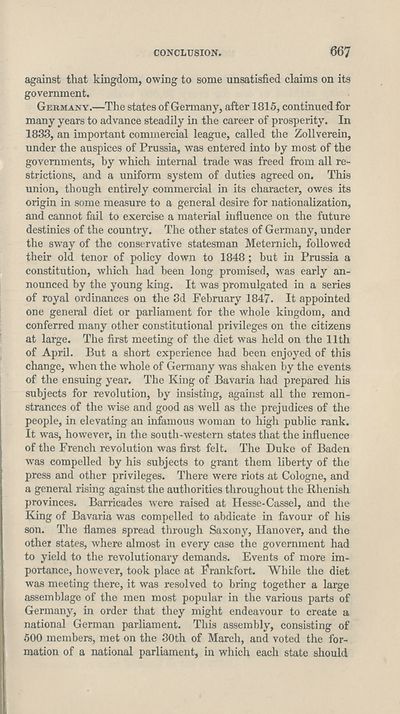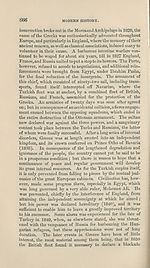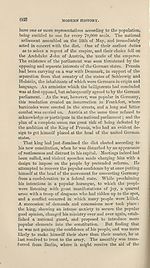Download files
Complete book:
Individual page:
Thumbnail gallery: Grid view | List view

CONCLUSION. 667
against that kingdom, owing to some unsatisfied claims on its
government.
Germany.—The states of Germany, after 1815, continued for
many years to advance steadily in the career of prosperity. In
1833, an important commercial league, called the Zollverein,
under the auspices of Prussia, was entered into by most of the
governments, by which internal trade was freed from all re¬
strictions, and a uniform system of duties agreed on. This
union, though entirely commercial in its character, owes its
origin in some measure to a general desire for nationalization,
and cannot fail to exercise a material influence on the future
destinies of the country. The other states of Germany, under
the sway of the conservative statesman Meternich, followed
their old tenor of policy down to 1848; but in Prussia a
constitution, which had been long promised, was early an¬
nounced by the young king. It was promulgated in a series
of royal ordinances on the 3d February 1847. It appointed
one general diet or parliament for the whole kingdom, and
conferred many other constitutional privileges on the citizens
at large. The first meeting of the diet was held on the 11th
of April. But a short experience had been enjoyed of this
change, when the whole of Germany was shaken by the events
of the ensuing year. The King of Bavaria had prepared his
subjects for revolution, by insisting, against all the remon¬
strances of the wise and good as well as the prejudices of the
people, in elevating an infamous woman to high public rank.
It was, however, in the south-western states that the influence
of the French revolution was first felt. The Duke of Baden
was compelled by his subjects to grant them liberty of the
press and other privileges. There were riots at Cologne, and
a general rising against the authorities throughout the Rhenish
provinces. Barricades were raised at Hesse-Cassel, and the
King of Bavaria was compelled to abdicate in favour of his
son. The flames spread through Saxony, Hanover, and the
other states, where almost in every case the government had
to yield to the revolutionary demands. Events of more im¬
portance, however, took place at Prank fort. While the diet
was meeting there, it was resolved to bring together a large
assemblage of the men most popular in the various parts of
Germany, in order that they might endeavour to create a
national German parliament. This assembly, consisting of
500 members, met on the 30th of March, and voted the for¬
mation of a national parliament, in which each state should
against that kingdom, owing to some unsatisfied claims on its
government.
Germany.—The states of Germany, after 1815, continued for
many years to advance steadily in the career of prosperity. In
1833, an important commercial league, called the Zollverein,
under the auspices of Prussia, was entered into by most of the
governments, by which internal trade was freed from all re¬
strictions, and a uniform system of duties agreed on. This
union, though entirely commercial in its character, owes its
origin in some measure to a general desire for nationalization,
and cannot fail to exercise a material influence on the future
destinies of the country. The other states of Germany, under
the sway of the conservative statesman Meternich, followed
their old tenor of policy down to 1848; but in Prussia a
constitution, which had been long promised, was early an¬
nounced by the young king. It was promulgated in a series
of royal ordinances on the 3d February 1847. It appointed
one general diet or parliament for the whole kingdom, and
conferred many other constitutional privileges on the citizens
at large. The first meeting of the diet was held on the 11th
of April. But a short experience had been enjoyed of this
change, when the whole of Germany was shaken by the events
of the ensuing year. The King of Bavaria had prepared his
subjects for revolution, by insisting, against all the remon¬
strances of the wise and good as well as the prejudices of the
people, in elevating an infamous woman to high public rank.
It was, however, in the south-western states that the influence
of the French revolution was first felt. The Duke of Baden
was compelled by his subjects to grant them liberty of the
press and other privileges. There were riots at Cologne, and
a general rising against the authorities throughout the Rhenish
provinces. Barricades were raised at Hesse-Cassel, and the
King of Bavaria was compelled to abdicate in favour of his
son. The flames spread through Saxony, Hanover, and the
other states, where almost in every case the government had
to yield to the revolutionary demands. Events of more im¬
portance, however, took place at Prank fort. While the diet
was meeting there, it was resolved to bring together a large
assemblage of the men most popular in the various parts of
Germany, in order that they might endeavour to create a
national German parliament. This assembly, consisting of
500 members, met on the 30th of March, and voted the for¬
mation of a national parliament, in which each state should
Set display mode to:
![]() Universal Viewer |
Universal Viewer | ![]() Mirador |
Large image | Transcription
Mirador |
Large image | Transcription
| Antiquarian books of Scotland > Education > Elements of universal history on a new and systematic plan > (687) |
|---|
| Permanent URL | https://digital.nls.uk/127588384 |
|---|
| Description | Thousands of printed books from the Antiquarian Books of Scotland collection which dates from 1641 to the 1980s. The collection consists of 14,800 books which were published in Scotland or have a Scottish connection, e.g. through the author, printer or owner. Subjects covered include sport, education, diseases, adventure, occupations, Jacobites, politics and religion. Among the 29 languages represented are English, Gaelic, Italian, French, Russian and Swedish. |
|---|

